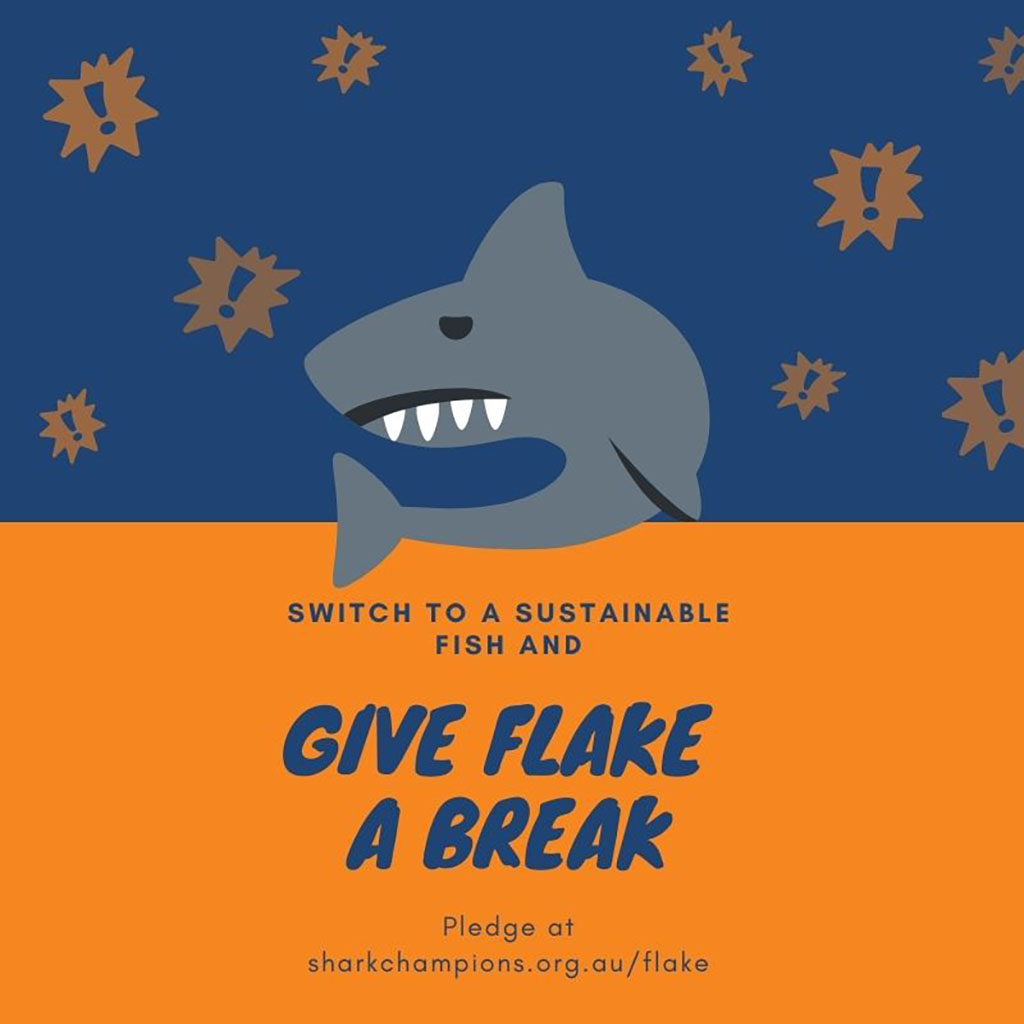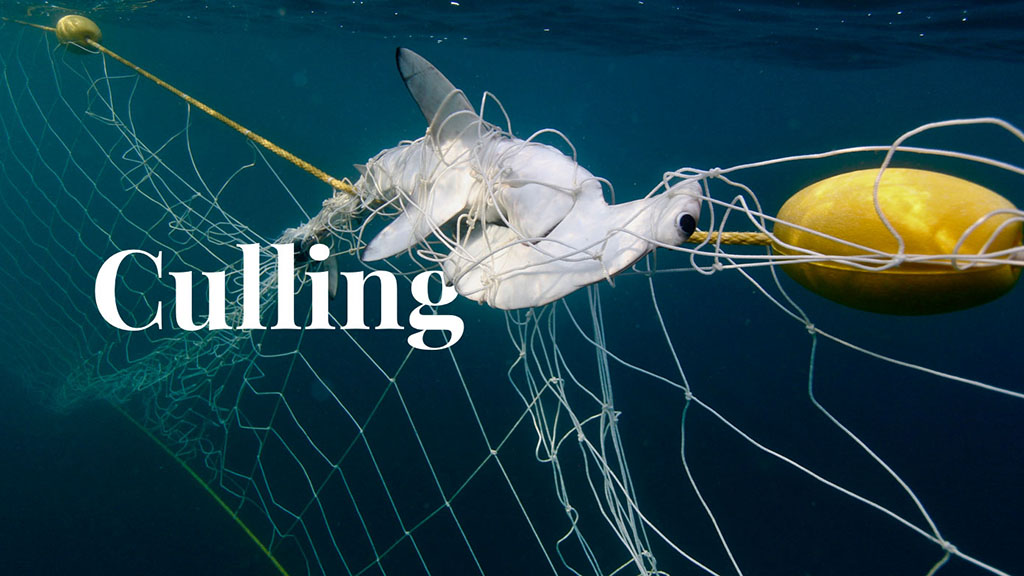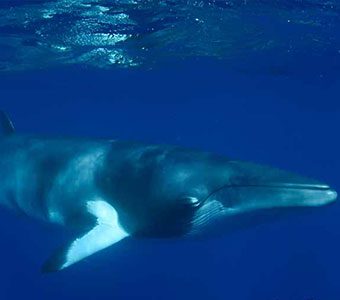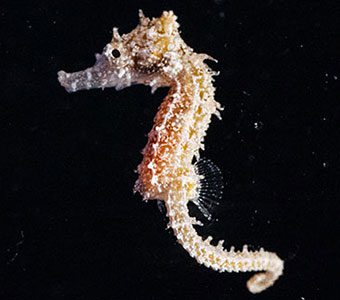Have you ever enjoyed a serving of flake and chips? Here’s why you should consider what you’re eating and why you should #GiveFlakeABreak.
Most of us at some point have enjoyed a takeaway fish and chips by the beach, and flake is often the standard ‘type’ of fish served at your local Aussie chip shop. But have you given thought to what flake actually is? Flake is a more palatable name for shark. It is supposed to refer to shark meat from gummy and rig sharks which are not endangered, but in Australia, there is no legal obligation to call shark meat for what species it is or where it’s from.
Loopholes in Australia’s national environmental law permit the harvest of endangered sharks. So endangered school sharks, endangered scalloped hammerheads, and critically endangered whitefin swellshark can end up on your plate as a flake.

#GiveFlakeABreak
The Australian Marine Conservation Society (AMCS) recently launched the #GiveFlakeABreak campaign, encouraging Aussies to be careful about what they’re being served up disguised as Fish and Chips, suggesting we choose a sustainable seafood alternative – because endangered shark can end up on your plate as ‘flake’.
The AMCS recently surveyed the menus of 70 fish and chip shops across Australia that sell shark meat and found that less than a third (29%) of shark meat on sale referred to a specific species. The remaining are labeled generically as “flake” and in one case, “boneless baby shark”, meaning it’s impossible to tell what you’re eating. Endangered school shark, endangered scalloped hammerheads, and critically endangered whitefin swellsharks can all be legally harvested and end up on Aussie plates.
According to recent data from various Fisheries and Australian Fish Stocks reports, endangered sharks caught and sold in recent years include:
- 4,729 scalloped hammerheads in 2019 (1)
- 6,461 school shark in 2018 (2)
- 2,667 whitefin swellshark in 2018 (3)
However, the survey also found that at least 40% of fish and chip shops surveyed sell a sustainable alternative. Use GoodFish: Australia’s Sustainable Seafood Guide to choosing a sustainable fish.
AMCS shark scientist Leonardo Guida said sustainable alternatives to flake include whiting, farmed barramundi, mullet and wild-caught Australian salmon – and the difference in price is often as little as two dollars (sometimes cheaper).
“Australia legally permits the harvest of endangered sharks, which can end up on people’s plates and they wouldn’t even know it because it’s often called flake,” Guida said, “There’s no legal requirement to call a shark for what it is.”

Who are Shark Champions?
Shark Champions, a joint initiative of the AMCS and the Humane Society International (HSI), is a collective of everyday wildlife-loving Australians working towards better conservation outcomes for sharks. Sharks are a vitally important species for Australia’s ocean ecosystems, but current policies are letting them down in fisheries, at our beaches and throughout our oceans. So, what threats do sharks face, and how can we all help?
Fisheries
The biggest threat to shark populations in Australia and around the world is overfishing. Sharks are one of the most threatened groups of marine animals with 30% of the world’s species facing the threat of extinction. Sharks are vulnerable to fishing pressure because, like us humans, they mature slowly, give birth to relatively few young, and are long-lived. Put simply, the rate of sharks fished from the ocean exceeds their ability to reproduce.

Culling
If you’ve been to see the recently launched documentary Envoy: Shark Cull, you’ll be aware that Australia is one of the only countries in the world to actively kill sharks in the name of bather protection. Culling programs are not only ineffective at protecting ocean users, but they come at a huge cost to sharks and other marine life.
There are shark nets installed at 51 beaches in New South Wales and 23 beaches in Queensland. These nets are the most indiscriminate of all shark control measures, catching everything from Hammerhead Sharks to Humpback Whales.
Despite a 2019 court case led by HIS, lethal drumlines are still in operation in our World Heritage-listed Great Barrier Reef and throughout Queensland. Drumlines use baited hooks to catch and drown sharks. Many sharks are also shot dead on these drumlines if found alive.
Both NSW and Western Australia are trialing the use of SMART drumlines to reduce the lethal take of sharks but concerns still remain over the stress and injury caused by capture. Both states are also using non-lethal technology as part of shark bite mitigation strategies, but unfortunately, Queensland lags behind.
Threatened Species
Home to 322 different species, Australia is a shark and ray hotspot. Yet sharks around Australia are under threat from fishing, lethal shark control, habitat loss and pollution. Legal protection is needed to combat these threats, especially for those species most impacted.
There are 62 species of sharks and rays found in Australian waters that are listed as Endangered, Threatened or Vulnerable under the IUCN Red List. However, only 15 of these are considered protected under Australian laws. Many species, like the thresher shark, are on the IUCN Red List of Threatened Species but are not listed for protection in Australia.
Diveplanit and the AMCS
If you’ve ever clicked through to the ‘About Us’ page on our website, you’ll have noticed that we’re Gold Sponsors of the Australian Marine Conservation Society (AMCS), whose advocacy work we wholeheartedly admire and respect.
The AMCS campaign tirelessly to save our oceans, with campaigns such as Fight For The Reef which advocates for a switch to renewable energy, many local campaigns to help establish (or retail) marine reserves – such as the recent campaign to try to save Bateman’s Bay Marine Reserve and a joint initiative with the Humane Society International to save our sharks: Shark Champions.



